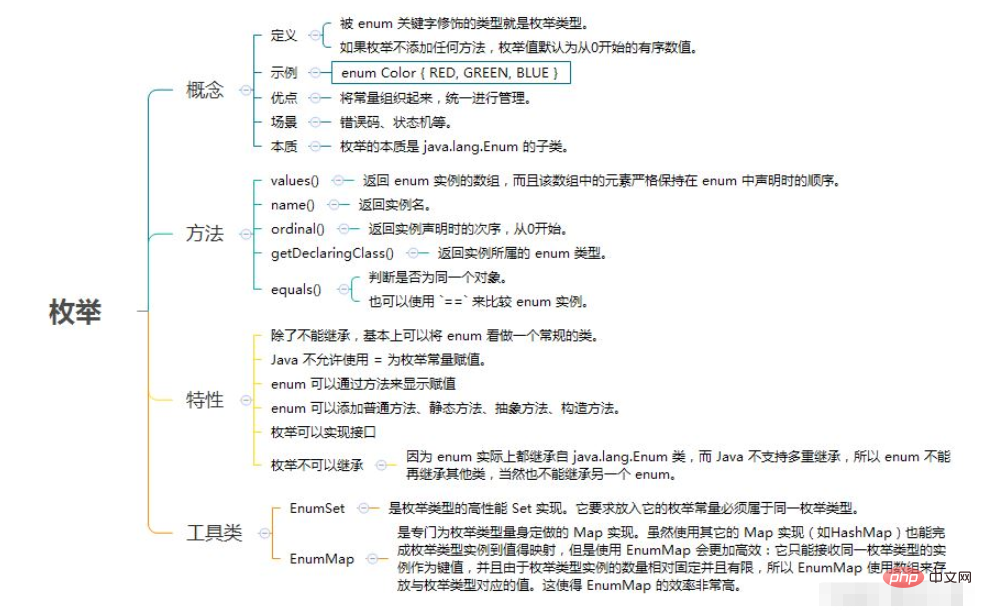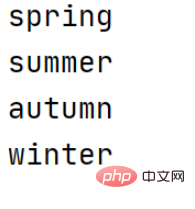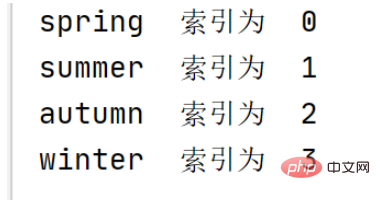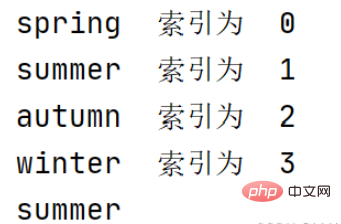How to use enumerations in Java
Enumeration (enum)
An enumeration is a collection of named integer constants, used to declare a set of constants with identifiers. Enumerations are very common in daily life. For example, a person's gender can only be "male" or "female", a week can only be one of the seven days, etc. Like this, when a variable has several fixed possible values, it can be defined as an enumeration type.
The Java enumeration class is defined using the enum keyword, each constant is separated by a comma, and a semicolon is used at the end to end

Define a season Enumeration class
enum Season{
spring,summer,autumn,winter;
// 常量有 spring, summer, autumn,winter,分别表示春天,夏天,秋天,冬天,系统会自动添加 public static final 修饰
}enum Season{
spring,summer,autumn,winter;
// 常量有 spring, summer, autumn,winter,分别表示春天,夏天,秋天,冬天,系统会自动添加 public static final 修饰
}
public class SeasonEnum {
public static void main(String[] args) {
System.out.println("请输入季节"+"\n"+"1、春天"+"\n"+"2、夏天"+"\n"+"3、秋天"+"\n"+"4、冬天");
Scanner scan =new Scanner(System.in);
int seasons= scan.nextInt();
change(seasons);
}
private static void change(int seasons) {
Season season=Season.spring;
switch (seasons){
case 1:
season=Season.spring;
break;
case 2:
season=Season.summer;
break;
case 3:
season=Season.autumn;
break;
case 4:
season=Season.winter;
break;
}
System.out.println(season);
}
}Enumeration class
The enumeration class defined by enum inherits the java.lang.Enum class by default and implements both java.lang.Serializable and java.lang.Comparable interface.
values(), ordinal() and valueOf() methods are located in the java.lang.Enum class:
values() returns all values in the enumeration class .
The ordinal() method can find the index of each enumeration constant, just like an array index.
The valueOf() method returns the enumeration constant of the specified string value.
values() method
values( ) methodYou can return all members of the enumeration in the form of an array, or you can get it through this method A member of an enumeration type.
enum Season{
spring,summer,autumn,winter;
// 常量有 spring, summer, autumn,winter,分别表示春天,夏天,秋天,冬天,系统会自动添加 public static final 修饰
}
}
public class SeasonEnum {
public static void main(String[] args) {
// 迭代季节
for (Season season : Season.values()) {
System.out.println(season);
}
}
}Result:

ordinal() method
ordinal() method You can get the index position of a member in the enumeration. The following example creates an enumeration type Signal containing 3 members, and then calls the ordinal() method to output the members and their corresponding index positions.
enum Season{
spring,summer,autumn,winter;
// 常量有 spring, summer, autumn,winter,分别表示春天,夏天,秋天,冬天,系统会自动添加 public static final 修饰
}
}
public class SeasonEnum {
public static void main(String[] args) {
// 迭代季节
for (Season season : Season.values()) {
// ordinal可以找到每个枚举常量的索引,就像数组索引一样。
System.out.println(season+" 索引为 "+season.ordinal());
}
}
}Result:

valueOf() method
valueOf() method returns the specified string value Enum constants
enum Season{
spring,summer,autumn,winter;
// 常量有 spring, summer, autumn,winter,分别表示春天,夏天,秋天,冬天,系统会自动添加 public static final 修饰
}
}
public class SeasonEnum {
public static void main(String[] args) {
// 使用 valueOf() 返回枚举常量,不存在的会报错 IllegalArgumentException
System.out.println(Season.valueOf("summer"));
// System.out.println(Season.valueOf("summ"));
}
}Result

Enumeration class members
Enumerations can use their own variables, methods and Constructor, the constructor can only use private access modifier, so it cannot be called externally.
Enumerations can contain both concrete methods and abstract methods. If an enumeration class has an abstract method, every instance of the enumeration class must implement it.
enum Season{
spring,summer,autumn,winter;
// 常量有 spring, summer, autumn,winter,分别表示春天,夏天,秋天,冬天,系统会自动添加 public static final 修饰
// 构造方法
private Season(){
System.out.println("Constructor called for :" +this.toString());
}
public void SeasonInfo(){
System.out.println("spring");
}
}
}
public class SeasonEnum {
public static void main(String[] args) {
Season season=Season.spring;
season.SeasonInfo();
}
}The above is the detailed content of How to use enumerations in Java. For more information, please follow other related articles on the PHP Chinese website!

Hot AI Tools

Undresser.AI Undress
AI-powered app for creating realistic nude photos

AI Clothes Remover
Online AI tool for removing clothes from photos.

Undress AI Tool
Undress images for free

Clothoff.io
AI clothes remover

AI Hentai Generator
Generate AI Hentai for free.

Hot Article

Hot Tools

Notepad++7.3.1
Easy-to-use and free code editor

SublimeText3 Chinese version
Chinese version, very easy to use

Zend Studio 13.0.1
Powerful PHP integrated development environment

Dreamweaver CS6
Visual web development tools

SublimeText3 Mac version
God-level code editing software (SublimeText3)

Hot Topics
 1378
1378
 52
52
 Perfect Number in Java
Aug 30, 2024 pm 04:28 PM
Perfect Number in Java
Aug 30, 2024 pm 04:28 PM
Guide to Perfect Number in Java. Here we discuss the Definition, How to check Perfect number in Java?, examples with code implementation.
 Random Number Generator in Java
Aug 30, 2024 pm 04:27 PM
Random Number Generator in Java
Aug 30, 2024 pm 04:27 PM
Guide to Random Number Generator in Java. Here we discuss Functions in Java with examples and two different Generators with ther examples.
 Weka in Java
Aug 30, 2024 pm 04:28 PM
Weka in Java
Aug 30, 2024 pm 04:28 PM
Guide to Weka in Java. Here we discuss the Introduction, how to use weka java, the type of platform, and advantages with examples.
 Smith Number in Java
Aug 30, 2024 pm 04:28 PM
Smith Number in Java
Aug 30, 2024 pm 04:28 PM
Guide to Smith Number in Java. Here we discuss the Definition, How to check smith number in Java? example with code implementation.
 Java Spring Interview Questions
Aug 30, 2024 pm 04:29 PM
Java Spring Interview Questions
Aug 30, 2024 pm 04:29 PM
In this article, we have kept the most asked Java Spring Interview Questions with their detailed answers. So that you can crack the interview.
 Break or return from Java 8 stream forEach?
Feb 07, 2025 pm 12:09 PM
Break or return from Java 8 stream forEach?
Feb 07, 2025 pm 12:09 PM
Java 8 introduces the Stream API, providing a powerful and expressive way to process data collections. However, a common question when using Stream is: How to break or return from a forEach operation? Traditional loops allow for early interruption or return, but Stream's forEach method does not directly support this method. This article will explain the reasons and explore alternative methods for implementing premature termination in Stream processing systems. Further reading: Java Stream API improvements Understand Stream forEach The forEach method is a terminal operation that performs one operation on each element in the Stream. Its design intention is
 TimeStamp to Date in Java
Aug 30, 2024 pm 04:28 PM
TimeStamp to Date in Java
Aug 30, 2024 pm 04:28 PM
Guide to TimeStamp to Date in Java. Here we also discuss the introduction and how to convert timestamp to date in java along with examples.
 Java Program to Find the Volume of Capsule
Feb 07, 2025 am 11:37 AM
Java Program to Find the Volume of Capsule
Feb 07, 2025 am 11:37 AM
Capsules are three-dimensional geometric figures, composed of a cylinder and a hemisphere at both ends. The volume of the capsule can be calculated by adding the volume of the cylinder and the volume of the hemisphere at both ends. This tutorial will discuss how to calculate the volume of a given capsule in Java using different methods. Capsule volume formula The formula for capsule volume is as follows: Capsule volume = Cylindrical volume Volume Two hemisphere volume in, r: The radius of the hemisphere. h: The height of the cylinder (excluding the hemisphere). Example 1 enter Radius = 5 units Height = 10 units Output Volume = 1570.8 cubic units explain Calculate volume using formula: Volume = π × r2 × h (4




